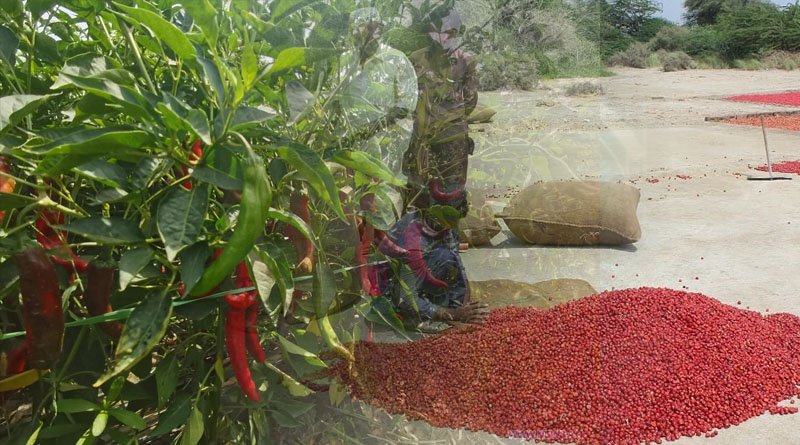Pakistani chili farmers face many problems, such as not having access to modern farming tools, not being able to export their crops, climate change, urbanization, and research and development.

Chili is an important spice and vegetable crop that is cultivated and consumed all over the world. Chili growers in Pakistan face many problems, such as not having access to modern farming tools, not being able to export their crops, climate change, urbanization, and research and development.
Chilies are known for their spicy flavor and strength, and they are used in a wide range of dishes. Chili has an essential role in the world’s food culture, economy, and health, making it a valuable crop for both farmers and consumers.
Chili is one of the most important crops in Pakistan, giving many farmers money and work. According to the Food and Agriculture Organization of the United Nations (FAO), Pakistan was the world’s fifth-largest producer of chili in 2020, with 2,137,934 tons produced.
Pakistan is a significant chili exporter, with the majority of its exports moving to nearby countries such as Iran, Afghanistan, and India, with some exports also going to Gulf countries.
There are a lot of problems for chili farmers in Pakistan that make it hard for the agriculture sector to grow:
Lack of access to modern farming technology
One of the major problems faced by chili growers in Pakistan is the lack of access to modern farming techniques and technology. Many farmers in Pakistan still rely on traditional farming practices and methods, which can reason to lower the quality and yield of crops and reduce profitability.
This lack of access to modern technology also makes it difficult for farmers to efficiently manage pests and diseases, which can have a significant impact on crop yields. So, this issue could resolve by providing proper training and education to farmers on new farming methods, as well as providing financial assistance to purchase new equipment and technology.
Limited access to credit and financing
Another issue faced by chili growers in Pakistan is limited access to credit and financing. Many farmers lack the collateral required to secure loans from formal financial institutions, making it difficult for them to invest in their farms and improve their crop yields. To resolve this problem government should assist farmers with small loans and other financial services so that farmers can invest better in their crops’ viz. they can purchase healthy seeds, fertilizers, pesticides, and equipment and can earn better.
Climate change
Climate change is also a significant concern for chili growers in Pakistan. Changes in temperature, precipitation, and extreme weather events can have a negative impact on crop yields, making it more difficult for farmers to plan and manage their farms. So, farmers should be informed and trained about how to adapt to changing weather patterns, as well as by investing in research and development to create new crop varieties that are more resilient to changing climate conditions and there should be effective policies to tackle climate change.
Improper transport infrastructure
The lack of proper storage and transportation infrastructure is another problem faced by chili growers in Pakistan. Poor storage and transport infrastructure can lead to post-harvest losses and reduced profitability for farmers. So, there is an essential need to invest in modern storage and transportation facilities and upgrade the existing ones, as well as provide assistance to farmers with low-cost and better facilities for storage and transportation.
Limited access to international markets
Limited access to international markets for exports is also a challenge for Pakistani chili growers. They face intense competition from other chili-producing countries, making it difficult to export their products to other countries. Additionally, high competition from imported chilies is a major concern, as imported chilies are often cheaper and of better quality. There is a need to provide farmer training and assistance about the rules and regulations of international markets, as well as advocating for fair trade agreements that benefit farmers.
Unstable domestic market
Price fluctuations in the domestic market are also a problem for chili growers in Pakistan. Prices for chili can fluctuate greatly in the domestic market, making it difficult for farmers to plan for and manage their finances. This could be solved by creating branding and marketing campaigns that promote the quality and unique characteristics of Pakistani chili.
Urbanization
The increasing population is another big issue and cause of many other issues. Due to increasing population and urbanization, water resources have been depleting, leading to water shortages for irrigation. This is a big problem for chili growers as water is essential for the growth of the crop. So, there should be proper strategies for water resource management and urbanization. In this regard, modern irrigation practices like drip irrigation and sprinkler irrigation could be adopted that can use water resources more effectively.
Research and development
The lack of proper research and development for chili cultivation is a significant problem for chili growers in Pakistan. Without proper research and development, crop yields can be suboptimal and profitability can be reduced. To tackle this issue, it needs to invest in research and development to create new chili varieties that are more resistant to pests and diseases, have better yields, and are more suitable for different climates and soil types.
In conclusion, Pakistani chili growers have to deal with a number of problems that make it hard for this industry to grow. Getting rid of these problems would help the chili industry in Pakistan grow. For example, giving farmers access to modern farming techniques and technology, making it easier for them to get credit and money, and investing in the right storage and transportation infrastructure would all help a lot.
